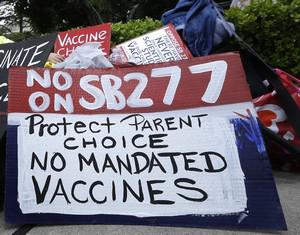Considered opinion: Truth decay & measlesA global wave of measles cases fed by conspiracies and misinformation has health officials worried
The number of people infected with measles keeps rising in the Washington State and neighboring Oregon. Rick Noack writes that “complacency over vaccinations has been accompanied by outright rejection of the scientific evidence on measles vaccines that has saved over 21 million lives since 2000, according to the WHO. Unsubstantiated conspiracy theories on supposedly negative side effects of vaccinations, either against measles or in a broader context, have gained momentum in some communities, in the United States and other countries.” He notes that deliberately spreading misinformation on vaccines to suggest that citizens are being lied to by their leaders has become a go-to recipe of some populist politicians. Thus, after years of railing against vaccines and even proposing a law against them in 2015, Italy’s Kremlin-supported Five Star Movement is now part of the country’s government.

Anti-vaccination rally // Source: theconversation.com
The number of people infected with measles keeps rising in the Washington State and neighboring Oregon, and health officials warn that complacent parents are putting their children at risk of contracting a virus that can potentially be lethal. More than fifty cases have been reported in the two states since the beginning of the year.
The World Health Organization (WHO) warned in a report released Thursday the other countries have recently seen a surge in measles cases. Worldwide, researchers estimate that there were 6.7 million cases in 2017, with the vast majority occurring in poorer countries. Between 2016 and 2017, reported cases surged by 30 percent — including in some unexpected parts of the world.
Rick Noack writes in the Washington Post that “There were 15 times more measles cases in Europe last year than in 2016, and new outbreaks were also recorded in South America and parts of Asia. Authorities in the Philippines said this week that a recent outbreak of the virus — with more than 1,800 cases so far — could put millions of children at risk.”
He notes that measles immunization rates in the East Asian country have fallen to 60 percent, “down 15 percent from the previous year, in part because of fearmongering over vaccines in a country that already struggles to inoculate its poorest.”
He continues:
In Washington, the immunization rate is still at 90 percent, but researchers say that a rate of at least 95 percent is needed to prevent an outbreak.
“The picture for 2018 makes it clear that the current pace of progress in raising immunization rates will be insufficient to stop measles circulation,” Zsuzsanna Jakab, a Europe-focused senior official with the World Health Organization, was quoted as saying.
